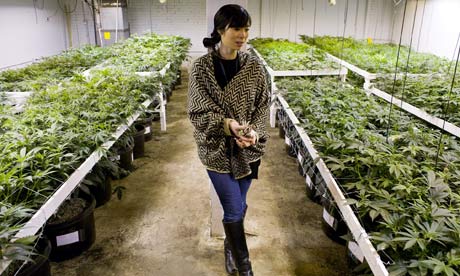The Grass Is Always Greener: the Future of Legal Pot in the US
 On January 1st, 2014, Colorado has become the first state in the US to legalize marijuana for both recreational and medicinal purposes. If your idol is „the Dude” and you love stoner movies, you likely cheered upon reading the news. But apparently, if you worship the likes of Zuckerberg, Bezos or Jobs and love making money more than toking on a joint, you may cheer all the same…
On January 1st, 2014, Colorado has become the first state in the US to legalize marijuana for both recreational and medicinal purposes. If your idol is „the Dude” and you love stoner movies, you likely cheered upon reading the news. But apparently, if you worship the likes of Zuckerberg, Bezos or Jobs and love making money more than toking on a joint, you may cheer all the same…
At the end of the popular TV series „Weeds„, the bereaved widow turned pot–mogul heroine goes finally legal with her hitherto unlawful business of selling high quality pot. It takes her a good few years to get from a MILF-weed peddler to a legitimate business owner, with many mishaps along the way. Surprisingly, Weeds the series reflected the reality of weed the drug perfectly, with all those mishaps and obstacles along the way of it, the weed, becoming legal. The show was slightly ahead of its time, ending when it did in 2012 — but also ending on a clear message of advocating legal pot.

People started to embrace that notion around the same time: in 2013 a whopping 58% of Americans were in favour of making this soft drug legal, according to Pew Institute poll. Much to the chagrin of many vocal naysayers, the ever divided Congress upheld the will of the people in two states, Washington and Colorado. Later on, in February of this year, the Congress has also passed the farm bill that makes it possible to cultivate hemp commercially — i.e., grow weeds — not unlike a regular vegetable.
Colorado was joined by Washington soon after, becoming the second state to legalize possession of marijuana for non-medicinal purposes (in other words, just to get high). Of course, it’s more complex than simply allowing everyone and their dog to smoke pot, but in essence it boils down to less criminal prosecution, a lot less hassle for the police (which lessens the cost to the taxpayer) and to a lot more options for the lovers of „chronic” out there.

All of a sudden, weed has become legal — and yet the earth didn’t open up, the skies didn’t fall and the world didn’t end. Colorado’s legal ganja did actually good by the state: in the first month alone, excise tax proceeds of USD 1.24 mln were garnered, which is twice the amount collected on alcohol over the same period of time, according to NBC. Later estimates put the number even higher, at USD 2 mln. Projections say that revenue from legal pot will exceed USD 1 billion before the end of the year, and, much like the plant in question, the burgeoning legal weed sales are likely to grow over time. ArcView Group, an investment and research company, has analyzed the market and given the conservative number of 64%. This is how much the industry will grow by the end of 2014, going up from current USD 1.4 bln to 2.34 bln in just under a year, their research predicts. That’s on top of the expected — but still welcome — sharp drop in crime rate across the two states.

Elsewhere, in home state of the abovementioned TV series „Weeds”, California, the pot is still illegal, but there’re already rumours of the new Silicon Valley look-alike on the horizon. And the history of Silicone Valley’s own bubble bursting back in the 1990s may actually help businesses prepare properly to any future instability ahead of time. Already serious investors warn against investing for short-term profit only. Justin Hartfield, CEO of Ghost Group located in Newport, California – a company that manages and owns marijuana tech start-ups and services including Weedmaps, a mapping app that tracks marijuana dispensaries, says that it’s more prudent to invest into weed with a longer perspective in mind.
Recreational weed is gaining momentum on the tech front not only in California. As viewers of „Weeds” may recall, growing it properly is not easy or cheap. Many companies are taking notice of the possible tech applications – from Colorado-based Surna that builds cold-water climate controllers, to LED-based system of grow lighting provided by San Francisco’s LumiGrow, through to Agrisoft, a company from Kansas, Missouri, that tags and tracks plants from their seedling state all the way to the dispensaries using a sophisticated system of RFID sensors and fingerprint identification. But so far the biggest „wow” factor lies in another recent trend – vaping.

Vaping, or using e-cigarettes to inhale so-called „safe” nicotine in various forms, has had a lengthy and complex relationship with weed, considering the earliest use of water pipes was not with tobacco products, but with other, more „far out” plant leaves. While typical liquid nicotine e-cigarette is quite different from a vaporizer in function, both uses are called „vaping”. Today, despite the legalization of pot locally, the federal ban hurts this corner of the industry the most. Because of the regulations, companies that offer new and cool-looking vaporizers have to market them as e-smoking paraphernalia, aimed at the „safe” use of tobacco leaves. Such products as Pax from Ploom, a company that produces top-shelf vapes, to Uptoke that uses simple „load. grind. vape.” formula, to Firefly — a futuristic and extremely cool vaping gadget — will eventually reach a wider clientele if the legislation is changed, earning their owners a lot of money.

But real economic benefits could be much, much greater, since the law that enabled the sales of marijuana also stipulated that the sellers need to also grow their weed, and only the existing medical dispensaries are allowed to sell recreational pot, at least for the first nine months. This means that once infrastructure is in place and farmers can grow the green stuff to sell it freely, the revenue will grow accordingly. Some experts, like Bill Chaaban of Creative Edge Nutrition (a company that plans to produce medicinal weed), claim that the legal pot market can become larger than tobacco and alcohol markets combined, reaching a grand total of USD 10 billion in revenue by 2018. Investment is very lucrative right now, even if quite risky, according to investment specialists.

It’s quite obvious that the greatest problem that faces the industry at the moment is being able to operate on the federal level. Colorado and Washington may have legalized their local pot trade, but around the country the drug is still an illegal substance, and thus any money obtained from its sales may also be considered less than kosher. And since banks operate on a federal level, most of them shy away from accepting any form of finance related to cannabis growing, selling or transport. Even though DOJ allowed special consideration for businesses that are legitimate in their own state, banks were still hesitant to grant credit cards or run accounts. In February, banks were officially allowed to accept money from pot trade, yet even today many are still reluctant to take the possibly „dirty money”. But clean or dirty, big money is still flowing in from all sides.
Possible large-scale investment opportunities may thus be tied mostly to the cultivation and production of the core commodity of this market, i.e. weed. According to Terra Tech CEO Derek Peterson, „There is going to be a value in the companies that own and control state-issued permits for retail dispensaries and commercial cultivation throughout the country.” His company makes agricultural equipment and is located in Irvine, California, and will likely benefit from the legal pot trend. Despite the positive outlook, Peterson warns about the possible problems that investors may face, adding that, „Investors should look at whether the company has a good product or service and if they are operating in a location that is supportive of medical cannabis-related companies,” since the country is still deeply divided on the issue.

This is not just a moral or ethical objection, either. Legislation that allowed pot sales was already limited in many ways, but state legislators want to make sure that profits are used on education, programs that prevent driving under the influence of the drug, programs that make youth aware of the dangers of the drug and other marijuana-related programs dealing specifically with the social impact the drug will have in the future. Colorado Governor John Hickenlooper was against the legalization but plans to make the most out of the profits from the sales of pot. „We view our top priority as creating an environment where negative impacts on children from marijuana legalization are avoided completely,” wrote Hickenlooper in a recent letter about the proposed tax proceeds use.
As odd as it may sound, children may benefit from marijuana in a much more direct fashion. While several cannabis strains have shown various positive effects on health owing to cannabidiol or CBD, a substance that can inhibit some cancers from metastasizing, other research showed possible uses in many other illnesses, not just as a last-resort drug for pain management.

In 2011, parents of Charlotte Figi, a 5-year-old living in Colorado, turned to medicinal marijuana after no conventional methods were able to help their little daughter. She had a rare condition that caused her to have seizures, often several hundred a week, and the new marijuana strain reduced that to just a few every few days. The strain is now called Charlotte’s Web and is already used by hundreds of patients suffering from similar seizures. What is important about it, is that it contains very little of the other substance, THC, which gives its user „a high”. But no matter what the use – medical THC, medical CBD or recreational THC use – marijuana is likely to be legalized all over the US soon, opening up a new, still very controversial, but also very exciting market for years to come.
VOCABULARY
recreational – rekreacyjny, dla przyjemności
medicinal – medyczny, w celach medycznych
dude – koleś
stoner – nałogowy palacz marihuany, ćpun
to cheer sth – powitać coś wiwatami
to worship – wielbić, czcić
the likes of sb – ludzie tego typu, ludzie tacy jak ktoś
to toke on a joint – sztachnąć się dżojem, zaciągnąć się skrętem
weeds – chwasty, zielska, tu: trawka
bereaved – pogrążony w smutku
widow – wdowa
sb turned sb – ktoś, kto zmienił się w kogoś, osoba, która stała się kimś
pot – trawka
mogul – potentat
heroine – bohaterka
to go legal – zacząć działać w ramach prawa, uczynić coś legalnym
hitherto – dotychczas, uprzednio
MILF (Mom I’d like to F**k) – atrakcyjna seksualnie starsza kobieta; tu: odmiana trawki z serialu Weeds
peddler – handlarz (narkotyków)
legitimate – legalny, zgodny z prawem
mishap – niefortunny wypadek
to reflect sth – odzwierciedlać coś
drug – narkotyk
obstacle – przeszkoda
(to be) ahead of one’s time – wyprzedzać swój/czyjś czas
to advocate sth – orędować za czymś
to embrace sth – przyjmować coś, akceptować coś
notion – pojęcie, przeświadczenie
whopping – gigantyczny
to be in favour of sth – opowiadać się za czymś
poll – ankieta
much to the chagrin of sb… – ku czyjemuś wielkiemu niezadowoleniu
naysayer – krytyk, ktoś otwarcie i głośno sprzeciwiający się czemuś lub potępiający coś
ever divided – wiecznie podzielony
to uphold sth – podtrzymać coś, poprzeć coś
to pass sth – przyjąć coś (ustawę)
bill – projekt ustawy
to cultivate – uprawiać, hodować
hemp – konopie
not unlike sth – całkiem podobnie do czegoś
possession – posiadanie
to get high – naćpać się
complex – skomplikowany
everyone and their dog – wszyscy bez wyjątku
in essence – w gruncie rzeczy, w istocie rzeczy
to boil down to sth – sprowadzać się do czegoś
prosecution – zaskarżenie, ponoszenie odpowiedzialności (karnej)
hassle – zawracanie głowy
taxpayer – podatnik
chronic – trawka, zioło (pot.)
all of a sudden – ni z tego, ni z owego
ganja – gandzia, marycha (pot.)
excise – akcyza
proceeds – wpływy, dochód
to garner – zgarnąć, zgromadzić
according to – zgodnie z
estimate – wartość szacunkowa, wartość w przybliżeniu
projection – prognoza, przewidywana wartość
revenue – przychód, dochód, wpływy
to exceed – przekroczyć, przewyższyć
in question – o którym mowa
burgeoning – kiełkujący
research – badanie, badania
conservative – ostrożny (o szacunkowej wartości), konserwatywny
to predict – przewidywać
expected – oczekiwany
welcome – pożądany, mile widziany
crime rate – wskaźnik przestępczości
abovementioned – wyżej wspomniany
rumour – plotka
look-alike – wierna kopia, podobizna
bubble – bąbel, sztuczny i chwilowy boom gospodarczy, kończący się zapaścią rynku
to burst – pęknąć
ahead of time – przed czasem
to warn against sth – ostrzegać przed czymś
short-term – krótkotrwały, tymczasowy
CEO (Chief Executive Officer) – dyrektor naczelny
start-up – młoda spółka
app – aplikacja mobilna
to track sb – śledzić kogoś, monitorować czyjeś działania
dispensary – tu: apteka specjalistyczna
prudent – rozważny
to gain momentum – nabierać rozpędu
to take notice of sth – dostrzegać coś, zauważać coś
application – zastosowanie
climate controller – klimatyzator (przemysłowy)
to provide – zapewniać, dostarczać
to tag sth – opatrywać coś etykietą lub tagiem
seedling – sadzonka
sophisticated – skomplikowany, wyrafinowany
RFID – technologia identyfikacji radiowej RFID
sensor – czujnik
fingerprint – odcisk palca
vaping – palenie papierosa elektronicznego
to inhale – wdychać
various – rozmaity
relationship – zwiazek, relacja
considering sth – zważywszy na coś
water pipe – fajka wodna
tobacco – tytoń
far-out – odlotowy, nieziemski (pot.) (tylko przed rzeczownikiem)
liquid – płynny
vaporizer – waporyzator, parownica
ban – zakaz
to market sth – sprzedawać coś, handlować czymś
paraphernalia – akcesoria
aimed at sth – mający coś na celu, zorientowany na coś
top-shelf – z najwyższej półki (tylko przed rzeczownikiem, US)
to grind sth – (z)mielić coś
formula – schemat, recepta
firefly – świetlik
extremely – niezwykle
clientele – klientela, klienci
to enable – umożliwić
to stipulate – uwarunkować, określić warunek
existing – istniejący
stuff – rzeczy
accordingly – stosownie, odpowiednio
nutrition – odżywianie
combined – razem, w sumie
a grand total of X – łączna suma X
to face sth – stawać w obliczu czegoś (o czymś)
thus – zatem
to be considered sth – być uznawanym za coś/jakiegoś
kosher – tu: czysty, legalny (pot.)
to shy away from sth – trzymać się z dala od czegoś
finance – tu: pieniądze
cannabis – konopie indyjskie, marihuana (roślina)
DOJ (Department of Justice) – Departament Sprawiedliwości (US)
special consideration – tu: okoliczności łagodzące (złamanie prawa), warunki specjalne/preferencyjne
hesitant – niepewny, niezdecydowany
to grant – przyznać
account – rachunek
reluctant – oporny, niechętny
to flow in – spływać
to be tied to sth – być z czymś związanym, być zależnym od czegoś
core commodity – główny towar, podstawowy produkt (eksportowy, hodowli itp.)
value – wartość
state-issued – wydany przez państwo
permit – zezwolenie
retail – detaliczny
agricultural – rolny, rolniczy
equipment – sprzęt
to benefit from sth – skorzystać na czymś
outlook – perspektywa, przyszłość
to be supportive of sth – wspierać coś, wyrażać poparcie wobec czegoś
objection – sprzeciw
legislator – ustawodawca
to prevent – zapobiegać
influence – wpływ
youth – ludzie młodzi
aware – świadom
to deal with sth – zajmować się czymś
impact – wpływ
governor – gubernator
to make the most (out) of sth – jak najlepiej coś wykorzystać
environment – środowisko
to avoid – unikać
odd – dziwny
fashion – tu: sposób
strain – szczep, odmiana
owing to sth – dzięki czemuś, zważywszy na coś
to inhibit sth – pohamować coś, powstrzymać (rozwój czegoś)
to metastasize – robić przerzuty (o raku)
illness – choroba
last-resort – ostatniej szansy (tylko przed rzeczownikiem)
pain management – łagodzenie bólu
condition – schorzenie
seizure – napad, atak (choroby itp.)
to suffer from sth – cierpieć na coś, chorować na coś
to contain – zawierać
user – użytkownik, tu: ktoś, kto zażywa coś
-by Prochor Aniszczuk







